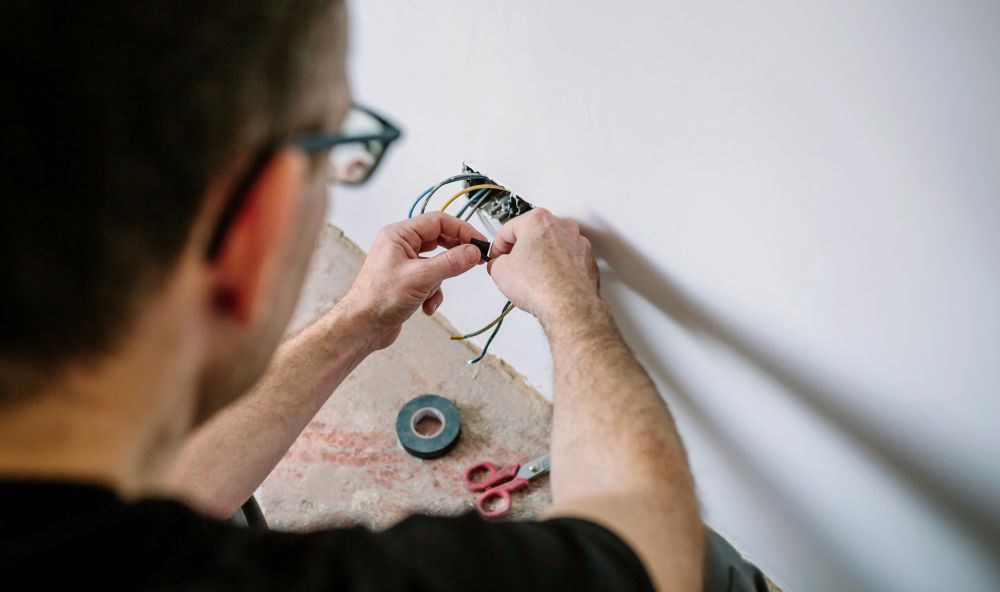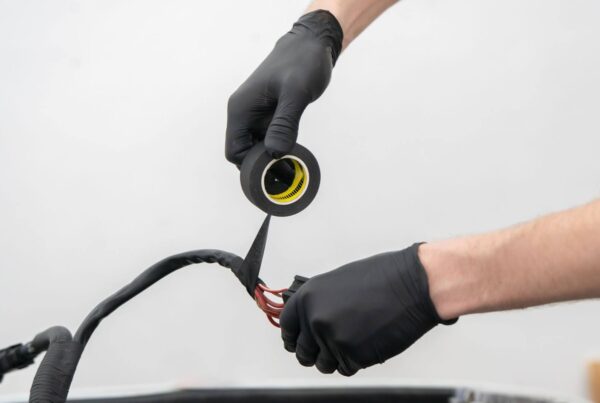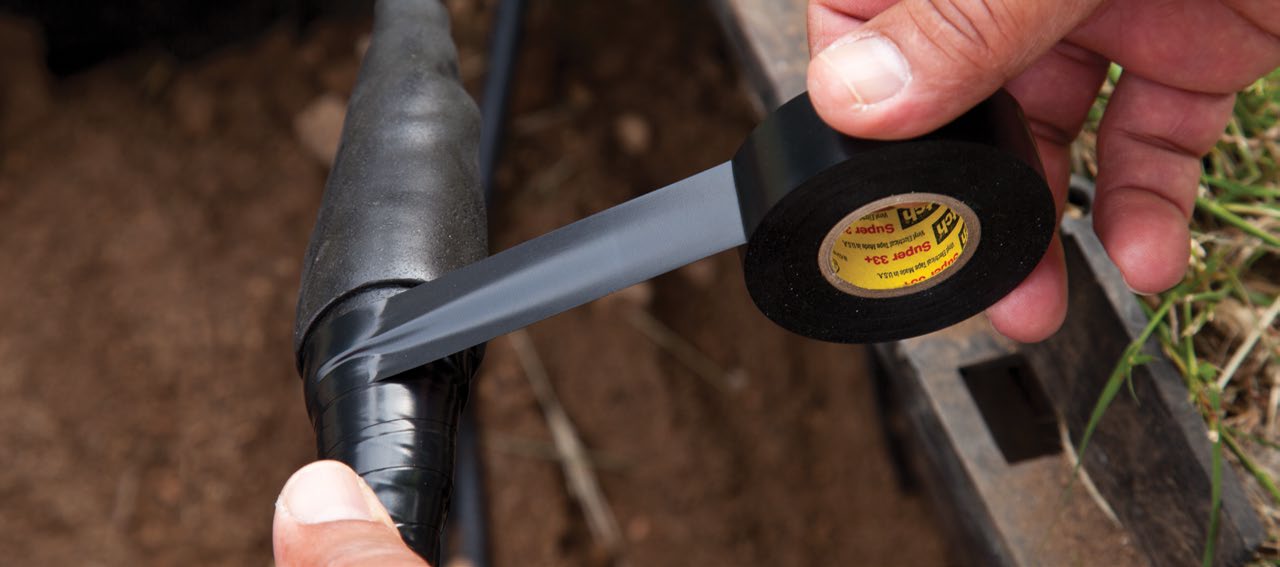
When it comes to anything electrical, safety is something that shouldn’t be overlooked.
While electrical tape might seem small, its role in electrical safety is more important than many people realise.
After all, there’s a reason it has its own category—regular tapes simply aren’t built to handle heat, current, or insulation the way electrical tape can.
When used properly, it insulates wiring, prevents short circuits, and protects devices and people. But if misused or poorly chosen, it can lead to serious hazards like electric shocks or even fires.
In this blog, we’ll explore what makes electrical tape safe, how to choose the right one, and where to get it.
What Makes Electrical Tape Safe?
The features of an electrical tape are what make it safer for electrical work than regular tapes at home. Some of the attributes to look for include:
- Flame retardancy: Electrical tape is designed to help prevent fire hazards rather than contribute to them. When exposed to flame, such tapes will soften and melt instead of igniting or sustaining a fire, which helps minimise the risk of flames spreading.
- Heat resistance: Premium vinyl electrical tapes resist peeling and breakdown in extreme temperatures, ensuring reliable performance across various environments. Always match the tape to the conditions of your application.
- Dielectric strength: Dielectric strength is an important quality for any material used as an electrical insulator. It measures how much electrical stress the material can handle without failing.
- Adhesion and flexibility over time: A quality electrical tape sticks well to surfaces and to itself, maintaining adhesion over time and across a range of temperatures.
The material used for an electrical tape also matters.
PVC (polyvinyl chloride) is one of the most common materials for electrical tape, known for its balance of insulation and its ability to cope well with outdoor applications and environmental factors. Vinyl, a subset of PVC, is also recognised to have additional capabilities such as superior stretchability and flexibility.
Another material used for an electrical tape is rubber, which can be used for both high-voltage insulation and low-voltage applications. Rubber tapes are also great for outdoor use because they repel moisture.
3M’s ethylene propylene and silicone rubber tapes have a high dielectric rating and are trusted by professionals for their strong insulation, especially in medium to high voltage jobs.
Safety Ratings and Certification Standards
Certifications and safety standards also apply to electrical tapes. UL (Underwriters Laboratories) and CSA (Canadian Standards Association) certifications are some examples of electrical safety standards to consider for wire tapes.
The presence of a UL or CSA marking on an electrical tape provides assurance that the product has been evaluated and certified for safe use under specified conditions.
Also, in looking for an electric tape, it is essential to take note of the temperature range and voltage they can withstand.
Practical Use Cases and Application Tips
Electrical insulation tape can be used in everyday electrical fixes and more specialised tasks. Specifically, it can be used in simple jobs like bundling wires or handling basic electrical repairs around the home.
For specialised tasks involving outdoor or moisture-prone environments, a rubber mastic tape creates a strong seal that protects against moisture and corrosion, making it ideal for splices, cable repairs, and other exposed connections.
Electrical works also often involve phase identification and colour coding for residential and commercial settings. Using a coloured electrical tape in such situations can help in organisation and safety.
No matter the job, always choose your tape based on the application environment and the voltage level involved. Using the right type ensures both performance and safety in the long run.
Where to Get Reliable Electrical Tape in Singapore
When it comes to electrical safety, using genuine, high-quality tape leaves no room for compromise.
That’s why it’s important to source your electrical tape from trusted suppliers who carry products that meet safety and performance standards.
In Singapore, Lim Kim Hai Electric is an authorised distributor of reputable electrical tape brands like 3M.
If you need an electrical tape for home repairs, industrial projects, or professional electrical work, buying from a reliable supplier ensures you’re getting authentic products you can trust for safety.
For Demanding Electrical Work
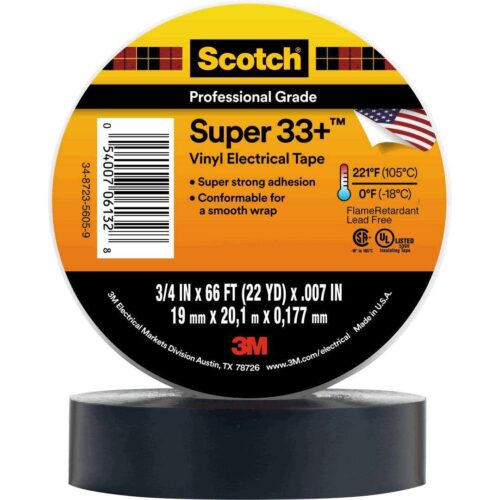 3M Scotch® Super 33+ Vinyl Electrical Tape
3M Scotch® Super 33+ Vinyl Electrical Tape
Scotch® Super 33+™ Tape offers strong adhesion, moisture-tight sealing, and withstands a temperature range of 0 to 221 °F (-18 to 105 °C), perfect for moist and tough industrial environments.
For Less Demanding Indoor Applications
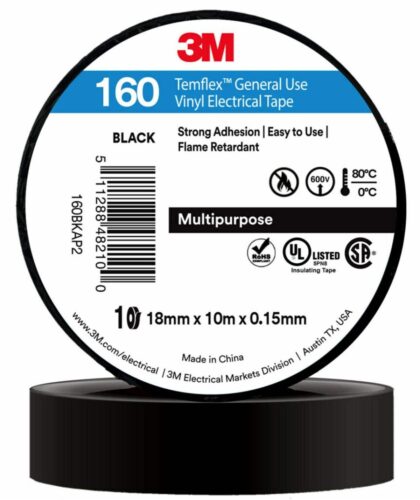 3M Temflex™ General Use Vinyl Electrical Tape 160
3M Temflex™ General Use Vinyl Electrical Tape 160
Temflex Tape 160 is a flame-retardant electrical tape, ideal for bundling, labelling, and insulating low-voltage cables in non-critical tasks.
For Cable Splice and Termination
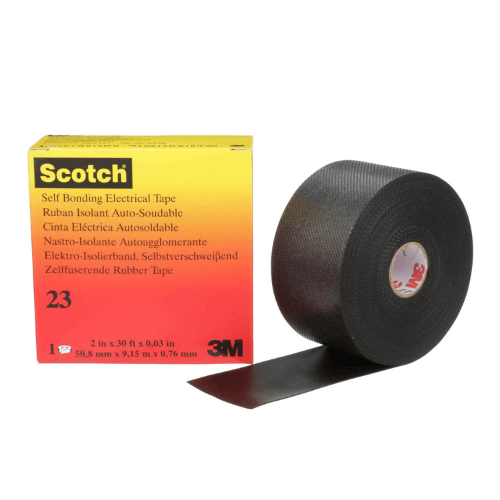 3M Scotch® Rubber Splicing Tape 23
3M Scotch® Rubber Splicing Tape 23
Scotch® Tape 23 can handle temperatures up to 90°C during normal use and up to 130°C in short-term emergencies. It’s used for insulating high-voltage cable splices (up to 69 kV), sealing out moisture, and protecting connections.
For Colour Coding Needs
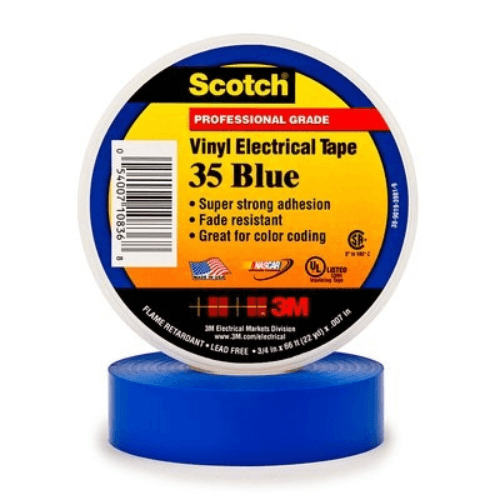 3M Scotch® Vinyl Color Coding Electrical Tape 35
3M Scotch® Vinyl Color Coding Electrical Tape 35
Scotch® Tape 35 is a durable, flame-retardant PVC electrical tape ideal for colour-coding, phase identification, and marking.
Electrical Tape vs. Other Insulating Solutions
While electrical tape is a go-to for many quick fixes, it’s just one of several insulating options available, each with its strengths.
For example, just like an electrical tape, wire nuts (a small plastic cap) are used to connect wires as well.
Another alternative is heat shrink tubing, where a flexible tube shrinks when exposed to heat, tightly conforming to the wire’s shape. The process ensures a snug and secure fit.
Their edge against electrical tapes is that tapes, over time, especially in high heat or moisture, can lose adhesion, which may cause wires to loosen. However, what makes tapes stand out is their ease of use and flexibility—you can apply them quickly, and it is ideal for fast fixes and on-the-go adjustments.
Choosing the right one, based on voltage, environment, and application, makes all the difference in safety and long-term performance.
Look for trusted brands with proven safety ratings, strong adhesion, and reliability across a range of tasks. For more premium 3M options, contact us today!

